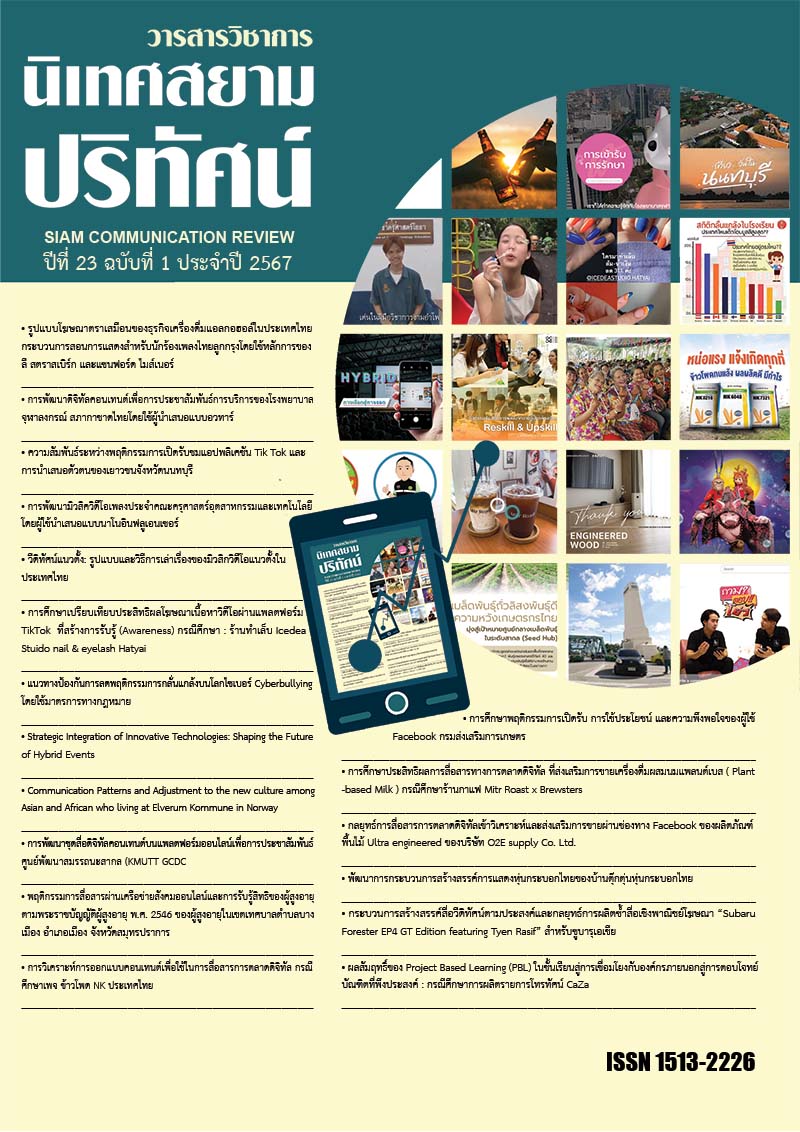กระบวนการสอนการแสดงสำหรับนักร้องเพลงไทยลูกกรุง โดยใช้หลักการของลี สตราสเบิร์ก และแซนฟอร์ด ไมส์เนอร์
Main Article Content
บทคัดย่อ
บทความนี้เป็นบทความวิจัยที่มีเนื้อหาเกี่ยวกับกระบวนการสอนการแสดงสำหรับนักร้องเพลงลูกกรุง โดยใช้หลักการและแบบฝึกหัดลี สตราสเบิร์กและแซนฟอร์ด ไมส์เนอร์มาปรับใช้สำหรับการสอน โดยมีวัตถุประสงค์คือเพื่อค้นหาแนวทางการสอนการแสดงและแบบฝึกหัดทางการแสดงที่เหมาะสมในการถ่ายทอดความรู้สึกผ่านบทเพลงสำหรับนักร้อง และเพื่อให้ผู้วิจัยได้ศึกษากระบวนการสอนการแสดงสำหรับนักร้องอย่างลึกซึ้ง ซึ่งในการวิจัยครั้งนี้ผู้วิจัยได้ดำเนินการในฐานะครูสอนการแสดง และได้เลือกศึกษากับนักร้องกลุ่มตัวอย่างจำนวน 5 คน โดยมีคุณสมบัติดังต่อไปนี้ 1) เป็นบุคคลกลุ่มเพศใดก็ได้ 2) เป็นผู้ที่มีอายุ 18 ปีขึ้นไป 3) เป็นผู้ที่มีพื้นฐานการร้องเพลงอยู่แล้ว 4) เป็นผู้ที่ต้องการพัฒนาศักยภาพของตนเองในด้านถ่ายทอดความรู้สึกผ่านบทเพลง ผู้วิจัยได้ออกแบบแผนการสอนที่เน้นใช้แบบฝึกหัดของลี สตราสเบิร์ก และแซนฟอร์ด ไมส์เนอร์ให้กลุ่มตัวอย่างได้ฝึกไว้เป็นหลัก ซึ่งมีระยะเวลาการสอนทั้งหมดจำนวน 12 ครั้ง ครั้งละ 3 ชั่วโมง และเมื่อกลุ่มตัวอย่างเรียนครบตลอดแผนการสอนแล้วจึงได้จัดคอนเสิร์ตประกอบวิทยานิพนธ์เพื่อแสดงต่อหน้าผู้ทรงคุณวุฒิเพื่อนำข้อเสนอแนะรวมถึงแบบสอบถามจากผู้ชมมาประเมินผล ผลการวิจัยพบว่าแบบฝึกหัดและหลักการของทั้งลี สตราสเบิร์กและแซนฟอร์ด ไมส์เนอร์ ที่ผู้วิจัยนำสอนสามารถใช้พัฒนานักร้องได้เป็นอย่างดี แต่ทั้งนี้ต้องขึ้นอยู่กับการเปิดใจและความกระหายอยากที่จะพัฒนาตนเองอย่างแท้จริงของตัวผู้เรียนเองด้วย เพราะพลังแห่งความตั้งใจนี้จะส่งผลให้ผู้เรียนไม่ทำอะไรอย่างครึ่งๆ กลางๆ และสามารถพัฒนาตนเองได้อย่างก้าวกระโดด อีกประการหนึ่งคือทักษะด้านการร้องเพลงของผู้เรียนเอง ผู้เรียนควรมีทักษะการร้องที่ดีอยู่แล้วจึงจะต่อยอดทักษะทางด้านนี้ต่อไปได้ เพราะหากยังพะวงเกี่ยวกับการร้องเพลงของตนเองอยู่ จะส่งผลทำให้เกิดภาวะที่เรียกว่าสมาธิผิดที่ได้โดยง่าย
Article Details

อนุญาตภายใต้เงื่อนไข Creative Commons Attribution-NonCommercial-NoDerivatives 4.0 International License.
เอกสารอ้างอิง
ดาวใจไพจิตร สุจริตกุล. (2555). กระบวนการถ่ายโอนต้นแบบการขับร้องเพลงไทยลูกกรุงของดาวใจ ไพจิตร. วิทยานิพนธ์ปริญญาศิลปกรรมศาสตรดุษฎีบัณฑิต สาขาศิลปกรรมศาสตร์คณะศิลปกรรมศาสตร์ จุฬาลงกรณ์มหาวิทยาลัย
พิชญ์สินี บำรุงนคร. (2543). ลักษณะความเป็นอมตะของบทเพลงสุนทราภรณ์. วิทยานิพนธ์ หลักสูตรนิเทศศาสตรมหาบัณฑิต ภาควิชาการสื่อสารมวลชน คณะนิเทศศาสตร์ จุฬาลงกรณ์มหาวิทยาลัย
ไพบูลย์ สำราญภูติ. (2550). เพลงลูกกรุง. กรุงเทพฯ: สำนักอุทยานการเรียนรู้
ภาสกรณ์ รุ่งเรืองเดชาภัทร์. การรับรู้คุณค่าของเพลงลูกกรุงในหมู่วัยรุ่น (Gen Z). วิทยานิพนธ์หลักสูตรศิลปศาสตร์มหาบัณฑิต สาขาวิชาการบริหารงานวัฒนธรรม วิทยาลัยนวัตกรรม มหาวิทยาลัยธรรมศาสตร์, 2563
มัยรา ศรีโมลา. (2540). การวิเคราะห์บทเพลงของ สง่า อารัมภีร์. ปริญญานิพนธ์ ปริญญาการศึกษามหาบัณฑิต วิชาเอกภาษาไทย มหาวิทยาลันศรีนครินทรวิโรฒ
วัชราภรณ์ อาจหาญ. (2535). การศึกษาและบทเคราะห์บทเพลงไทยสากลของสุนทราภรณ์. วิทยานิพนธ์ ปริญญาอักษรศาสตรมหาบัณฑิต ภาควิชาภาษาไทย คณะอักษรศาสตร์ จุฬาลงกรณ์มหาวิทยาลัย
วริศรา โกรทินธาคม. (2557). ภาษาจินตภาพในบทเพลงสวาทเชิงสังวาสที่ขับร้องโดย ทูล ทองใจ. วารสารมนุษศาสตร์และสังคมศาสตร์ มหาวิทยาลัยรังสิต
สมบัติ กิ่งกาญจนวงศ์. (2534). การวิเคราะห์เพลงลูกกรุง. ปริญญานิพนธ์ หลักสูตรปริญญาการศึกษามหาบัณฑิต วิชาเอกภาษาไทย มหาลัยศรีนครินทรวิโรฒ
ศิริรัตน์ รางวรรณนา และวรุณญา อัจริยบดี. (2562). การศึกษาแนวคิดที่ปรากฏในเพลงลูกกรุงของ
สุเทพ วงศ์กำแหง. คณะมนุษศาสตร์และสังคมศาสตร์ มหาวิทยาลัยราชภัฏสวนสุนันทา


